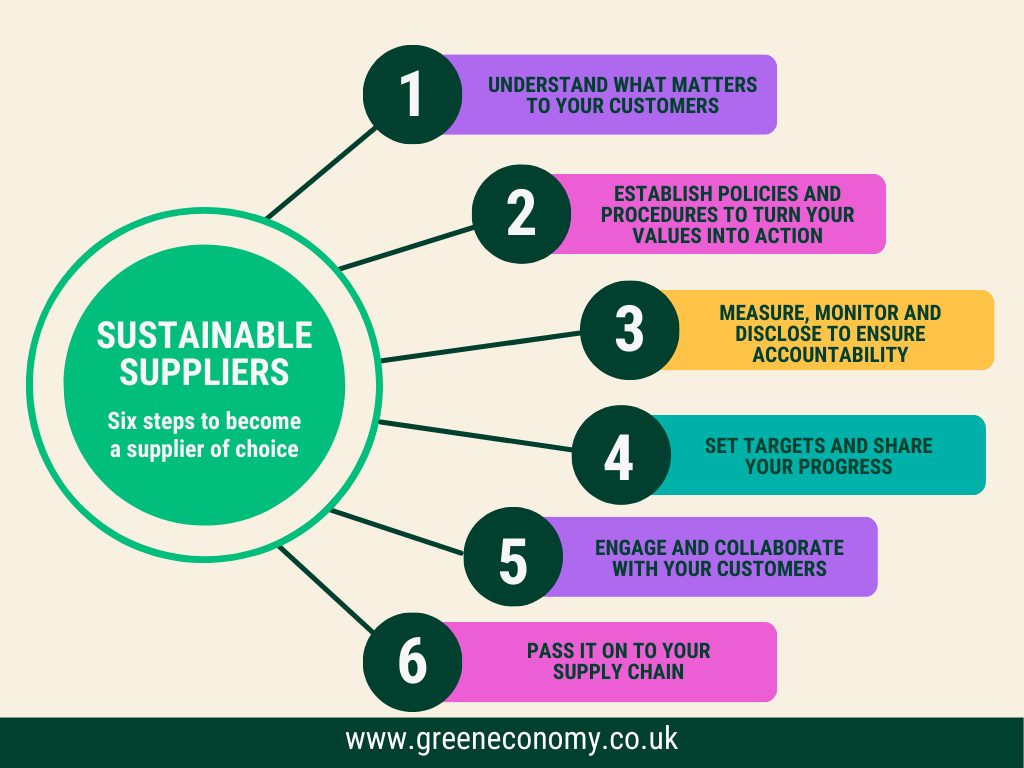
How to be a green supplier
Read time: 4 minutes
Research shows that the carbon footprint of the average supply chain accounts for 90 per cent of a business's carbon footprint, so it’s no wonder that large companies are increasingly looking beyond their own borders to deliver on their net zero targets.
Hundreds of the world’s largest organisations have now set targets to reduce greenhouse gas emissions in their supply chain. For example, Heineken has committed to achieving net zero across its entire value chain by 2040 and aims to work with suppliers to achieve a 30 per cent cut in emissions by 2030. HP has set the same 2040 goal, with the additional target of cutting supply chain emissions in half by the end of this decade. BMW has committed to reducing its supply chain emissions by 22 per cent on a per vehicle basis by 2030. The list goes on and on.
While most of these commitments focus on tier one suppliers in the first instance, many of the requirements being placed on these suppliers will naturally be passed on to their suppliers, causing a trickle-down effect that will ultimately impact everyone in the supply chain.
The drive to reduce supply chain emissions isn’t just about corporate responsibility; it’s also about managing risk. Research shows that businesses with large supply chains could face an estimated $120 billion (around £94.45 billion) in increased supply chain costs by 2026 due to climate change, deforestation and water insecurity. By improving transparency and engagement with suppliers, firms are more able to identify opportunities to reduce these risks and future-proof their business.
According to one survey in 2021, by 2025, nearly eight in ten multinationals plan to stop sourcing from suppliers who could negatively affect their carbon reduction commitments. Suppliers that can actively contribute to their customers’ climate ambitions are, therefore, increasingly at an advantage.
Common measures being taken by buyers to reduce the climate impact of their supply chain include increasing the weight of sustainability and social value criteria when selecting suppliers, adjusting procurement KPIs, and using management platforms such as Sedex, EcoVadis and Achilles to gather environmental supply chain data.
Here are some real-world examples:
SMEs are taking action, too:
The Carbon Trust has produced a useful introductory guide on how to become a good supplier to climate-conscious customers. Here are some additional tips:
Being a good supplier is partly about understanding your customer’s risks, providing them with the information they need and taking action to mitigate them yourself.
Scrutinise your customer’s environmental policy, the commitments they have made, or sustainability reports they have published to help you understand their values and priorities.
Direct feedback can also be useful. For example, One+All introduced new packaging material after customers expressed concerns about packaging waste in its annual customer survey.
Introduce a robust environmental company policy and make sure you can demonstrate compliance with all relevant environmental regulations when asked.
You should be able to demonstrate measures taken and an ongoing strategy to reduce the environmental impact of your operations, products and services, focusing on the areas that have the biggest overall impact. It may also be beneficial to explore whether any external accreditations or certifications could increase your standing with buyers.
Hard data, especially your carbon footprint (but also other key indicators such as energy, fuel, water and waste), is hugely valuable. Have this information ready for responding to supplier requests when needed, or better still, make it available in reports or on your website.
Crystal Doors is a particularly good example of an SME that has made as much information available on its website as possible, but it can be as simple as a clear environmental policy and a disclosure of your carbon footprint.
When you’re in a position to do so, set a formal net zero emissions target. The UK SME Climate Commitment is a formal route that allows you to become a signatory of the government-backed Race to Zero campaign.
Promote the progress and commitments you have made as part of your marketing strategy. You could consider building credibility by producing thought leadership pieces or blogs on how and why you are taking action. An annual update or report on your progress can also be a valued part of your documentation for customers.
Customers will often respond positively to advice and recommendations from their suppliers. You may be able to identify opportunities to improve environmental performance or make efficiencies that they might have missed, for example, through product or packaging eco-design. This could even lead to opportunities to provide new products and services.
Your supply chain is also your customer’s as well, so embedding sustainability into your own procurement will ultimately reduce risks for your customer downstream.
Start by introducing supplier surveys and inserting sustainability or social value criteria into your invitations to tender. Being able to demonstrate that you have sustainability-conscious suppliers will also improve your social value by association.


Help is here!
What is meant by climate change targets that are ‘science-based’, why are they important and how can businesses follow a science-based pathway in their own carbon reduction plans?
There are a dizzying number of environmental standards and accreditations available to businesses today. In this guide, we take you through the key products to help you identify the most appropriate option for your business.
Our teams offer support to help you reduce carbon, increase competitiveness and save money.
Based in York or Greater Manchester? We offer fully-funded support - provided at no cost to your business.
Explore our training programmes to help you accelerate climate action, embed your environmental policy within your business and deliver value for your business.
Contact us today to speak to a sustainability specialist, to help you improve the efficiency of your operation, save money and reduce your carbon impact.